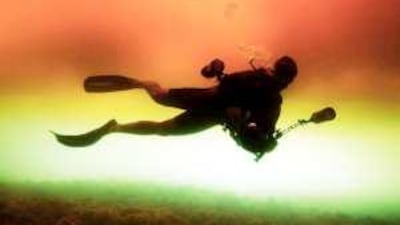ABU DHABI // Diving companies could be forced out of business by the red tide that has hit the coast for the past six months. Divers have stayed at home, reluctant to go out in the opaque, stinking water. "For the last five months, we've just been covering costs," said Dirk Ernert, the operations manager at Diver Down in Khor Fakkan, Sharjah.
He said his small diving club would not be able to continue if the red tide continued for another six months. "All of the private diving clubs that don't belong to a hotel, they will close." The bloom, which began in August, was at first expected to pass within a few weeks, Mr Ernert said. But it has grown unabated, killing fish and coral. "There's nothing you can do," he said, adding that the tide had been affecting the coast on Khor Fakkan periodically since October.
"Fish are floating, crabs are dead and corals are dying," he said. "If you drive to Khor Fakkan along the Corniche, you start to smell it in Fujairah." At lower depths, the water becomes black and visibility is low, according to Carla Jeffery, an open-water scuba instructor at Divers Down. "For pleasure divers, we're advising them to take torches," she said. "It's very extreme." In the past six months, the centre has had only four weeks of good diving conditions. When visitors call the centre to enquire about the state of the water, they are often turned away, she said.
"We have a couple who come every year from South Africa. They come specifically for the diving and they were only able to get into the water two or three times," she said. "Fortunately they had a good attitude." A thousand kilometres of coast in the UAE, Oman and Iran have been affected by the rust-coloured algal bloom. In January, delegates from the GCC met in Kuwait about monitoring the red tide. Scientists there discussed several theories as to the cause, including the discharge of raw or partially treated sewage, aquaculture farming and resort and port development.
Andrew Jubber, an instructor at Freestyle Divers in Dibba, Fujairah, has been diving in the UAE for more than six years. He said the conditions had never been worse. "There was a cyclone a few years ago. The amount of damage that did was minuscule compared to what this year's red tide has done," he said. When divers were able to get into the water, they saw coral bleaching, a sign of death caused by a lack of light and oxygen.
"We know we're losing business because of the red tide. But part of the problem is that people blow it out of proportion," Mr Jubber said. "They come on a day when there's red tide and then report it to their friends." Patches of clear water can still be found, said Gonjie Debeiena, an instructor at the Al Boom diving school in Fujairah. "There are still a lot of people diving, but it's not like before," he said. "There is no sign yet of when the red tide will go away, and now there's also plenty of jellyfish out."
At Scuba Dubai, Tim Soliman, a sales executive at the marine gear shop, said business had declined by as much as 60 per cent because of the bloom. "Red tide has badly affected business. It's coming back again. Last year there were practically no incidents of red tide and this year it's been bad for months," he said, adding that the outbreak has coincided with the global financial crisis, which has cut spending on diving gear and classes.
The water around Dibba was black, said Jeff Collett, an engineer who has been diving for 25 years. If the bloom continued, he feared that people would dive less. "If world gets around the diving fraternity, yes, people will stop diving here," he said. "I'll dive in most conditions but this was pointless. It was absolutely black. It was unbelievable." Although this year's diving season has been wrecked by red tide, Mr Jubber said he had faith in the resiliency of the marine life.
During a recent break of clear water, which lasted about three weeks, long-absent sharks and turtles slowly began to return to their abandoned feeding grounds around Fujairah. Then the tide returned. The marine life "won't be back at the level it was at for years," Mr Jubber said. "When the water clears up, people will dive and the fish will come back, but no one knows how long that will take." jgerson@thenational.ae

